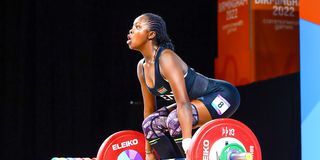
Kenyan Olympian Issa Laborde in action at Vaujany ski Resort, France where he trains. He was the forerunner for the Under-16 France Championships that took place on February 3-6, 2025.
Raising a child to become a star in sports is no easy feat. These mothers have made countless sacrifices, balancing their children’s sporting dreams with everyday responsibilities, and providing unwavering support for their success. Lifestyle asked these mothers, “how did you raise such successful children, teach them hard work and let them follow their interests — sports?
Irene Kwalia, mother to a footballer
Irene is a mother of three: two boys, Oliver and Aldrine, and one girl, Cherryl. Both of her sons are passionate about football, with Aldrine, 18, taking his talent to the next level. Currently based in Barcelona, Spain, Aldrine trains at the Nastic Academy.
Irene believes the key to Aldrine’s success is getting the right balance between sports and education.
Her son fell in love with football at the age of eight. Just like many children, Argentinian superstar Lionel Messi was his idol.
“For Aldrine, it was football 24/7. Even on his school books and examination papers, he’d write his name as Messi Lionel Kipchirchir,” she says.
She and her husband, Christopher Komen, established a pact with Aldrine: good grades in exchange for their full support in pursuing football.
“He did not disappoint us. Aldrine has consistently maintained above a B grade,” she says.
However, it has not been easy, especially attending tournaments and managing Aldrine’s schedule.
“Getting time to attend all the tournaments was a tall order,” says the head teacher of Poror Primary School in Baringo County.
“To succeed in football, you need a million touches of the ball or 10,000 hours before turning 18. So we had to subscribe to DStv to enable him to watch live and replay matches in the evening, and hone his skills and tricks by watching his football idols.”
Over the years, his talent earned him scholarships. He excelled in both the Kenya Secondary Schools Sports Association and the Cecafa Under-20 competition, where Kenya qualified for the Africa U-20 Cup of Nations for the first time in 2024. Nurturing a child’s talent is also costly. From a young age, they took him to soccer academies. There is also the cost of soccer boots, balls and transport.
“Taking conservative figures for about 10 years, Aldrine has used three balls and three pairs of boots per year. The cost of travel to 200 matches which I have attended, was about Sh2,000 per match, so what we have spent on Aldrine’s football comes to about Sh1 million when other hidden costs are factored in,” says Irene.
But away from the expenses, she has seen other benefits.
“He has gotten scholarships. His scholarship for high school alone was worth about Sh300,000 in fees. Now he is also on a scholarship in Spain worth a lot of money,” says Irene.
Her dream is to see Aldrine play professional football for Arsenal FC or FC Barcelona. She believes supporting a child’s passion for sports helps develop character, and the financial rewards can be immense.
Aldrine is currently pursuing a degree in Computer Science in Spain. “It is not yet time to celebrate. Aldrine is a work in progress,” says Irene.
To parents who are skeptical about sports, Irene says it is the best way to bond with your children. “The greatest gift I have given him is being his number one fan. Talent helps in character development. The financial rewards can also be huge.”
Peris Kengere, mother to weightlifter
Peris Kengere is mother to 20-year-old Rachel Achieng’ Enock, a weightlifter who has won multiple medals at the Africa Youth and Junior Championships and the African Senior Weightlifting Championships.

Kenya's Rachel Achieng competes in weightlifting at the Commonwealth Games in Birmingham, England on August 2, 2022.
Rachel has been competing in weightlifting since she was nine years old. She is the only one doing sports in her family of four girls.
“I’ve always motivated her. We ensure she has the necessary support, including eating well,” she says, “But it is costly. She eats a whole crate of eggs a month, all on her own. It can be stressful when she needs the eggs, and I have no money,” Peris says laughing. But despite the financial strain, Peris has seen the benefits of her daughter’s involvement in sports.
“She is well-mannered, has finished high school, and is about to go to college.”
Rachel got interested in weightlifting from a young age.
“Rachel fell in love with the sport by watching people lift weights in the gym. [Her family used to live near a gym in Langata, Nairobi.].”
When she was older, the coach spotted her and took her in.
However, the rigorous exercises that weightlifters go through would scare many parents.
“She has never suffered a major injury. She gets minor injuries which only require a physiotherapist,” she says.

Youngster Rachel Achieng' in action during the Commonwealth Games in Birmingham, UK on August 1, 2022.
Her advice to mothers whose children are pursuing sports, “If your child is talented, support her,” says Rachel, adding “people discouraged me from supporting her weightlifting talent. They said that she will be like a man. That she will not grow breasts. But look at her, she looks great.”
Josephine Laborde, mother to skier and cyclists

Josephine Laborde poses for a photo in Brié-et-Angonnes in 2025. She is the mother of French-born Kenyan skier Issa Laborde.
Josephine Laborde is a mother of three athletes. Her eldest son, Issa, represented Kenya in alpine skiing at the 2024 Winter Youth Olympics in South Korea, while her other children, Kenji and Neila, are passionate about BMX cycling. Issa, 17, trains with the Vaujany ski club in the southern French Alps.
“Kenji Gachingiri Laborde, 13, prefers BMX and trains with the Grenoble BMX club, just like Neila Wambui Laborde, 10, who shares the same enthusiasm for BMX in the southern French Alps,” Josephine told Lifestyle.
Josephine sees sports as more than just a competition; it’s a way for her children to stay active, express themselves, and build resilience.
“I like to think of sports as part of play. It’s about enrolling the children an activity that help them express themselves positively while staying active,” she says.
Despite the many challenges—financial strain, time commitments, and managing academic balance—Josephine and her husband prioritise emotional support and proper planning to help their children succeed.
“We’ve had to budget, adjust schedules, and be their emotional support,” she says.
Beyond the competitions or medals, Josephine says sports has helped instill discipline, and sense of responsibility in her children.
“It teaches them important life values that extend far beyond the game. It helps them handle stress, setbacks, and competition better. They’ve also built meaningful friendships and expanded their social circles,” says Josephine.
To ensure they remain motivated in the sport, while not forgetting academics, Josephine says she advises them to keep it fun.
As a parent of a star athlete, encouragement is important.
“We recognise small wins. We acknowledge personal bests, new skills, or resilience with small rewards like a special meal or new gear when possible. After events, we also discuss what went well and what they learned, helping them build confidence and self-awareness,” she says.
In times of loss, Josephine says she first gives them a big hug, then acknowledges their feelings, allowing them to express frustration, sadness, or anger without judgment.
“I then remind them that setbacks are a part of sports and life. We try to share stories of athletes who faced losses, rejections, or injuries and came back stronger,” she says.
As a mother, Josephine says the greatest gift she feels she has given her children in their sports journey is the openness and courage to try any sport.
“Ultimately, the best gift is helping them build confidence, character, and a passion that lasts beyond childhood,” she says, adding, “balancing family, work, and raising children in sports is challenging, but with the right mindset and planning, it is manageable.
Emma Caddy, mother to tennis players
Emma Caddy is the mother of three tennis players: Amani, 15, Liya, 13, and Naila, 11, who have all represented Kenya’s national team. Amani also plays volleyball and netball, Liya plays cricket, and Naila participates in netball, hockey, and cricket at school.

Tennis sisters Amani Gikunda (left) and Liya Gikunda (right) with their mother Emma Caddy pose for a photo at the ITF/CAT Eastern African Junior Individual & Team’s Zonal Championships held at the Nairobi Club from January 12-23, 2025.
Raising her daughters in sports has required discipline, consistency, and financial commitment.
“It takes passion, not just from them, but from me as well,” says Emma.
She highlights the importance of consistent training and realistic expectations, emphasising that success in tennis is earned through hard work, not innate talent.
“I’m being realistic about where they are in the journey. I know they’re only good at tennis because they’ve put in the time—they weren’t born good, so if they stop putting in the effort, they won’t do as well,” she says.
The benefits of sports?
“My girls are more confident, have good leadership skills, are not afraid of hard work, and have lots of friends outside of their social circle in Nairobi and across Africa,” she says.
Many parents struggle with picking the right sport for their children.
Emma tells Lifestyle that she too did not initially know tennis was the right sport for them, as they had been more focused on swimming and long-distance running.
“But when swimming places shut down during the Covid-19 pandemic, we had to find new outlets for their excess energy and competitive spirit. They were already playing tennis weekly, but not seriously. By mid-2020, tennis went from being a side interest to their main sport,” Emma says.
To celebrate their progress, Emma treats them to ice cream or sweets.
“They should be happy to celebrate their progress and wins through the experience itself, maybe with a medal or trophy. That should be reward enough,” she says.
She also encourages them to view losses as opportunities for growth.
“As long as they accept a loss and apply the lessons learned, the losses can be even more instructive than the wins. The longer you are in tennis you realise you need to focus on different goals than the short-term win. When one gets injured – like Liya is right now – you try to use the time to rest, catch up on school, and put in more time on the areas of the body that need work but haven’t had much attention. Try to be positive and constructive for the three weeks off court and the time can be well spent,” she adds.
As a mother, Emma believes the greatest gift she has given her children in their sports journey is consistency.
“If we say we’re training at 7am, we show up. I wake up at 5.30am for 11 out of 13 days in a row to get her up and take her to the tennis court on time. Many parents wouldn’t be willing to follow such a strict routine, because it means you also need to sleep early and stay healthy,” she says.
As a CEO, Emma has made sacrifices in her social life to ensure her daughters can thrive in the sport.
“I rarely drink and avoid going out in the evenings. I need rest and a clear mind, as my role as a CEO and entrepreneur with 80 staff across three countries is demanding. If I didn’t prioritise rest and self-care, neither my work nor my children’s sports would be possible,” she says.
She recalls the days when she would take them to the tennis court for a match, only for rain to interrupt, leaving her to wait by the court all day without them playing.
Her dream for her children?
“No matter where they end up, tennis has already enriched their lives and will continue to do so. My middle child wants to open a tennis academy in Kenya that trains elite players and offers sponsorships to those who can’t afford it. Perhaps that dream will come true.”
To parents who are not keen on their children doing sport, Emma advises doing it for character and strength development as a result.
Sports, especially tennis, benefit parents too.
“I’ve learned more about mindfulness by simply letting go and accepting what’s happening—losses, late matches, disorganisation, bad calls, painful defeats—through tennis than I ever could from any mindfulness self-help class,” she says.
“But it’s a sacrifice—of time, money—so don't step into it if you’re not ready and let go of your social life as well.”









